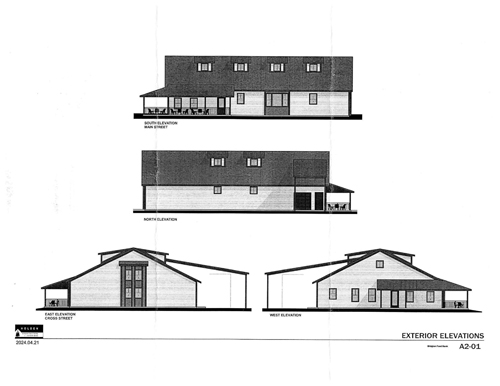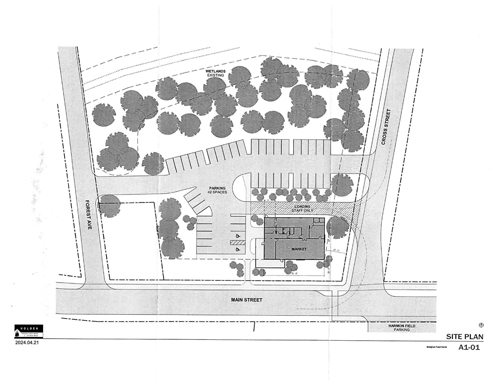Residents raise concerns about Food Pantry location

By Wayne E. Rivet
Staff Writer
Reed Holden was driving through town one day and saw a large number of people standing and sitting out in the cold.
The people were waiting their turn to enter the Bridgton Food Pantry.
“I look at the Pantry today and the shelves are empty by 2 or 3 o’clock in the afternoon because we don’t have the storage space. We have to take care of our people,” Holden told Bridgton Planning Board members.
Holden, who is a Bridgton Food Pantry Board of Directors member, presented an overview to Bridgton planners last month of a proposal to build a new facility at the former Smoak house property adjacent to Junior Harmon Field, off Main Street.

At the pre-application sessions, planners looked over the project and provided some “non-binding” advice.
“It’s an opportunity for you to ask questions,” Board Chair Deb Brusini said.
Back in December, the Bridgton Food Pantry purchased the 498 Main Street property, and then demolished a home and barn there.
The 3.17-acre site is situated between Forest Avenue, Main Street and Cross Street. The proposal includes an entry points on Forest Avenue and Cross Street, leading to parking space (42 slots). There is also a second entry on Cross Street for “loading” and to be used only by Pantry staff.
The floor plan calls for a covered porch area with some seating, leading to a 24-by-13 “arrival lounge.” Adjacent to the lounge is entry into the “market” space. The building also features a 17-by-15 cold storage area, a 44-by-24 dry storage space and 13-by-11 delivery/sorting room, along with a kitchen, bathrooms, and 13-by-7 office.
A 20-by-13 loading overhang leads to the delivery/sorting room.
A back portion of the site is listed as “existing wetlands” and will not be developed.
Holden noted that the Pantry building will be hooked to the town’s wastewater system.
The Pantry has operated for 38 years out of the former United Methodist Church basement. Initially, the Pantry served 10 families. Today, the Pantry has over 500 clients, and serve over 220 each week, Holden reported.
“It’s getting a little crowded there,” he said. “What you see is a very preliminary design. We’re looking for your feedback.”
Planning Board member Cathy DiPietro provided Holden with a shopping list of information — including a site plan survey, surface water drainage plan, narratives describing aspects of the project, setbacks and wetland delineations, as well as forming narratives regarding how the project meets Land Use standards and proof of financial capacity — the board will need to see before formally reviewing the application.
Holden noted that an engineering firm will complete a full survey of the property soon, and then the group will identify a contractor to build the facility.
Planner Dan Harden raised the point that both Forest Avenue and Cross Street “are very small streets” and how tractor trailer trucks will enter and exit the facility?
“We’re very concerned with having tractor trailers having to back up and ‘beeping’ all the time, which is going to drive the area people crazy,” Holden said. “So, we have a straight drive through (the property). It seemed like the smoothest way to do it.”
The Pantry has two deliveries a month via tractor trailers from Good Shepherd Food Pantry in Auburn.
Planners urged Holden to include number of deliveries, as well as rough timeframes.
Before, the Smoak home sat on a hillside. The plan will look to bring the property down to street level, which planners said might then require some retaining walls — all of which should be covered in the engineering reports.
“This seems like a wonderful project. I think in your narrative you might want to give, if you can come up with an estimate, of not only your hours and what the delivery hours would be, but also when you’re actively serving the community so that people will have those questions answered,” Planner Dee Miller said.
Brusini cautioned the need for a narrative regarding food preparation, pointing out that “heating up food that’s delivered” becomes a restaurant, which is not an allowable use in this district.
Holden said the Pantry will look at offering some level of education regarding food preparation.
“Some of our guests don’t know how to cook some of the food they’re getting, especially the healthy food they get,” Holden noted. “There has been some discussion about having a kitchen area for the sake of teaching, not actual cooking of food.”
Miller applauded the potential of adding a teaching element to the Pantry operation. “If you supply the food, you want to supply the food that will be used in the best way to help nutrition,” she said.
Neighbors speak out
News of a possible Food Pantry being built was a “big surprise to us,” one person said. “We wake up one day and somebody’s tearing down the homestead. We were really upset. I look at the plan and I see they can have an institutional use. This is a huge change to this neighborhood...A 3,000 square foot building is really big in our neighborhood. We all have little houses.”
Some neighbors felt Pantry officials should have reached out to them early in the process and explain what their proposal would look like.
“Right now, we feel blindsided,” a resident said.
Notice to abutting property owners regarding the Food Pantry’s pre-application meeting went out on May 1. The prelim hearing was held on June 4.
Code Enforcement Officer Brenda Day pointed out that notices were sent by registered mail not only to those property owners whose land abuts 498 Main Street, but also those within 100 feet. There were 22 certified mail notifications.
Brusini suggested to residents to pass along concerns and questions to planners to be entered into the public record and to Holden, who handed out business cards, so they can be addressed prior to the public hearing.
Resident Wendy Breton “strenuously” objected to the idea of having 225 extra families in the neighborhood every day (currently, the Food Pantry is open to the public on Tuesdays only), which would increase traffic in an area full of kids at the ballpark. She also raised concerns about light and noise pollution (noise from compressors), and the traffic impact upon wildlife residing in the wetland at the back end of the property.
She suggested as a fundraising tool that Pantry officials sell the property and seek another site.
“Why wasn’t our neighborhood notified?” Breton asked.
Brusini clarified that it is not the role of the Planning Board to notify abutters when a project is proposed, that duty falls on the developer, who sends out certified notices regarding a development or project.
“It’s our responsibility to make sure that he’s done that, and clearly, he did. What happened prior to the purchase of land is beyond the scope of our authority. Those are private land transactions,” Brusini noted. “I would just ask that you all attend the public hearing when it occurs.”
Holden said Pantry officials want to be “open” and willing to listen to concerns and deal with those concerns.
“We have to take care of our people, and we have to take care of you too. I’m sure we can come together and talk this thing through and figure out what to do here. Is everybody okay with that?” Holden asked.
A public hearing has yet to be scheduled, but when one is, a public notice will be posted on the town’s website as well as in The Bridgton News.


